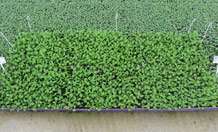Scientists grow plants with friendly fungi

Dr. Chris Thornton and colleagues at the University of Exeter are examining whether adding a safe and harmless fungus to compost boosts the growth and proliferation of crops' roots, helping them grow with less water. Not only that, trials currently underway with a supplier to a major supermarket are investigating whether the plants exposed to the fungus can also be grown in the absence of fertilizer.
Previous studies have shown that the fungus has properties as a natural biocontrol agent of pathogenic fungi and could reduce the need for synthetic fungicides. The technique also appears to improve drought tolerance.
The method of boosting root growth is simple. The fungus, T. hamatum (GD12 strain), is a free-living soil fungus that feeds on organic matter. The fungus is cultured in wheat bran which is added to the compost in which seedlings are first planted and it is here that root growth flourishes. After a period of growth, the seedlings are transplanted to the field for further growth. This is a common planting technique for many crops resulting in a highly compatible method for growers in the UK and across the world.
The field trial is a collaboration between university, grower and retailer. Manor Fresh Ltd in Lincolnshire supplies Marks & Spencer's with brassicas such as broccoli and sprouts, and M&S has been working closely with Dr. Thornton and its supplier in developing the technique.
A BBSRC Responsive Mode grant awarded to Dr. Thornton and Exeter colleague Professor Murray Grant is now supporting laboratory-based work that will attempt to unravel the molecular basis of the plant-growth-promotion phenomenon.
Dr. Chris Thornton of Biosciences in the College of Life and Environmental Sciences at the University of Exeter said: "This is an excellent example of collaboration between industry and fundamental research back at Exeter. We know the fungus produces a water soluble compound that stimulates plant growth, but why and how does the plant respond to this stimulus?
"There is potential to use it everywhere. With the move to sustainable methods to stimulate crop productivity these organisms are right up the agenda again. This is the first time there's been an interaction between a UK university department and plant growers to replace costly fossil fuel fertilisers with a strain of Trichoderma that boosts plant growth and at the same time acts as a biocontrol agent of root diseases."
The association between the fungus and the plant doesn't appear to be symbiotic because there's nothing in it for the fungus that we can so far see – this particular strain of Trichoderma (GD12) does not grow inside the plant's roots, instead it lives around them in a zone called the rhizosphere. But it is apparent that somehow the fungus is changing the way that the plant perceives its environment and causes changes in the plants' chemistry that increase root and shoot growth.
Provided by University of Exeter


















